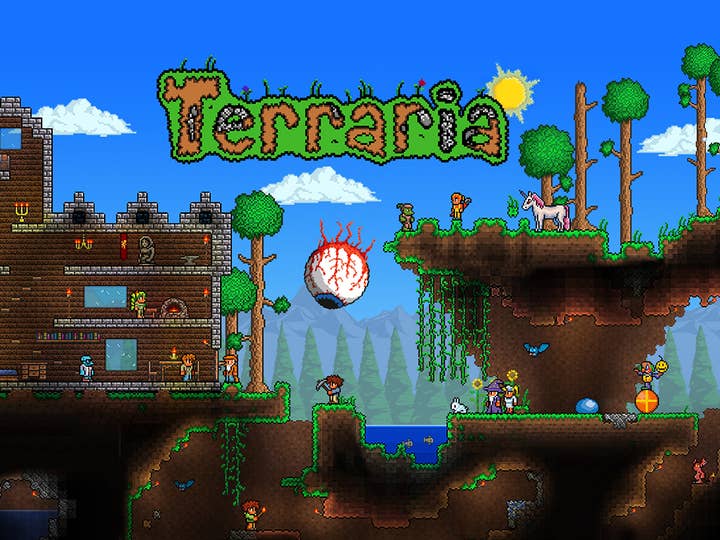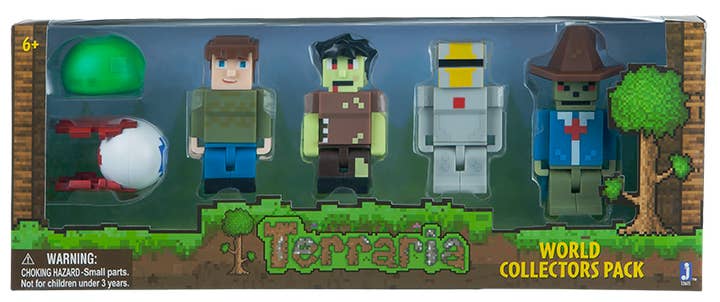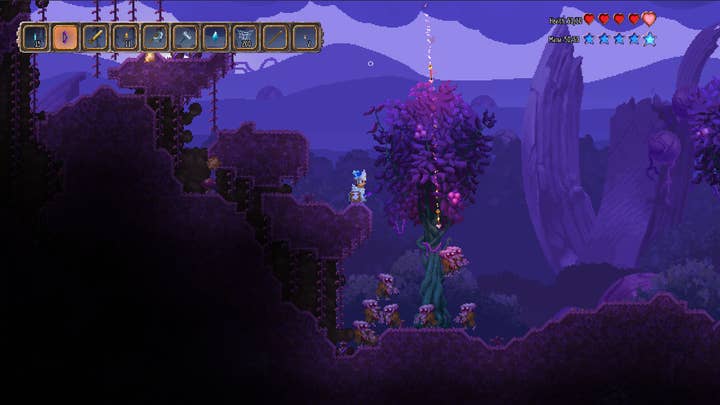Re-Logic: 'We're leaving money on the table with Terraria'
The developer explains why it hasn't charged a penny more for its smash hit indie game
When sandbox game Terraria first launched in May 2011, it had 250 items, a handful of playable characters and bosses, and a few nice extras.
Players could get all of that for the reasonable sum of $9.99.
Six years of updates later, and Terraria now has 3,800 items, 25 NPCs, 350 enemies, 16 bosses, a new ending, new areas, an expert mode and a load more nice extras. Developer Re-Logic didn't charge anything for these updates. The game still costs $9.99.
"Giving those updates away was a bit risky without a doubt," admits Re-Logic VP Whitney Spinks
"Some updates produce more new players than others, and it is often hard to tell what will happen with any given update. It more than likely leaves money on the table, as many players would gladly pay, especially for larger updates.
"That said, we wouldn't have it any other way. Perhaps it would be different if our fans weren't as supportive of us as they consistently are. We support them by adding to the game that they love to play, and they support us by spreading the word, sometimes buying more than one copy, showcasing more amazing potential in the game with the content that they create, and just by being awesome."
Re-Logic president Andrew Spinks adds: "In all honesty, as successful as Terraria has been, it isn't even what we consider to be the most valuable asset that Re-Logic has. That would be our reputation and the unwavering good will that we have built with our amazing fans."

That's not to say that the Re-Logic team hasn't considered charging for updates.
"We have had discussions around this topic in a variety of ways over the years," Andrew adds. "To give a small example, we could have charged some very small amount for the massive 1.3 update - let's say a dollar or less - and would have likely made several million dollars without much community blowback. This is what I was referring to in regards leaving money on the table. However, we strongly feel that forgoing those quick gains was and is the right path to take.
"Primarily, this speaks to our core philosophy of games and gamers first. Secondarily, it harks back to the way games were sold when we were coming up as gamers. Namely, you bought a game and enjoyed it. In this situation, we are just meshing that with the modern ability to update and add to that game over time. Deep down, it just feels to us like the right thing to do.
"Perhaps if our studio needed the extra funds to stay independent or to fund our other projects, we would have been forced into pursuing some of these things - we are cognizant that this route is not going to be possible for everyone. Fortunately, we are not in this situation. Given that, and the fact we have never been all about maximizing the money at the expense of customers, we have stayed true to our core principals. Business-wise, we truly feel that this will yield long term support for our company, which will allow us to make awesome games for a very long time - even if we didn't make every single dollar that we could have along the way."
The data suggests that Re-Logic's approach has worked. Terraria has sold 20.5m units, and 8.5m of that have come in the last 18 months. The game began on PC, and now exists on practically every device imaginable.
The sandbox action adventure game was the brainchild of Andrew Spinks, who taught himself programming and went on to build something that combined the likes of Zelda and Super Metroid with Dwarf Fortress and Minecraft.
It wasn't an easy birth. Spinks created most of the original game in his living room, and the team was just a few people and a handful of volunteers who all worked remotely. Between them, they had to overcome technical challenges, art issues and - of course - that indie developer curse: self-doubt.
"There were lots of frustrating moments where I worried that Terraria might be a waste of time," says Andrew. "Would people enjoy and want to play the game? Would it turn out the way I envisioned?"
"There were lots of frustrating moments where I worried that Terraria might be a waste of time"
Andrew Spinks, Re-Logic
Six years later, and Terraria's issues are quite different. Today, the company consists of 12 employees (all still working remotely), who spend their time developing business partnerships, licensing deals, new games and - of course - all those Terraria updates. The updates themselves are far more complicated than we might think, too. In fact, Whitney says the company's biggest challenge is avoiding issues of feature creep and bloat when adding to its flagship product.
Yet it's these updates that are accelerating the game's commercial performance. Terraria joins a rare breed of game that is selling faster now, six years later, than it did when it first launched. And the team believes there's still plenty of growth left.
"From a market potential perspective, Minecraft has sold over 100 million units," notes Ted Murphy, head of business strategy and marketing. "You'd figure that, at the very least, these people would be fans of the sandbox genre, so that leaves a ton of potential Terrarians that we have yet to reach.
"Awareness is Terraria's biggest obstacle to growing even bigger. We always joke that it is the biggest game that no one has ever heard of. Although that does appear to be changing a bit over the past couple of years."
Like Minecraft, Terraria has also found a lot of success in the physical retail market, both as a physical disc product (via 505 Games) and also through action figures, books, plush toys and clothes.

"It certainly tells us that indie games having success as physical items is a real possibility," Murphy continues. "That said, it is not really a one size fits all scenario where every game should pursue physical merchandise. There really are a few aspects to consider."
What sort of aspects?
"Well, it is good to ask yourself why do you want physical merchandise," he begins. "If the notion is that it will be a huge money maker for the studio, we would have to say that this is likely not going to be the case. Certainly, some games out there do make a big splash in merchandising, but that is the exception rather than the rule. We would strongly advise that anyone getting into physical merchandise do so with the idea that it would be something cool for your fans, a way to grow your community and a path to provide more reach/awareness of your game."
Business director David Phelps chimes in: "You should also do your due diligence and evaluate potential partners carefully. Focus on how your game will be represented and the level of creative control that you will have above and beyond anything else. Preferable business terms won't mean much to you if you are not proud of what is being put out there.
"Expect to spend time in creation and reviews and approvals if you want to put the level of polish needed on your game's merchandise"
David Phelps, Re-Logic
"Finally, understand that making something awesome and authentic will take time - your time. Expect to spend time in creation and reviews and approvals if you want to put the level of polish needed on your game's merchandise. Trust us, it will be worth it that day you have those amazing items on your shelves at home or in the studio."
Terraria is not the sum total of Re-Logic's current and future output. Of course, it sits at the heart of the business and there are other Terraria projects in the works, including the spin-off Terraria: Otherworld. "And Andrew already has ideas for Terraria 2," says Murphy. "We see Terraria as one of those long-standing video game franchises that people will be talking about 20 years from now while they are playing the latest instalment."
Yet the firm "would really love to move beyond just being 'The Terraria guys'". "We have a couple of projects going on that we have not spoken about publicly, and likely will not for a while, which are not Terraria-related and not in the sandbox genre," Murphy tells us. "These have the potential to be nice evolutions to contemporary games in the genres in which they will compete, and we are both excited and hopeful to see what gamers make of them."
In addition, Re-Logic has been teaming up with external developers, in what Andrew Spinks calls a 'second-party-style relationship'.
"It is simply a way for us to continue to pursue the various ideas that we have in mind without having to greatly expand our staff before we are ready," he explains. "It's so we can avoid the often immense financial pressures that come with high overhead - pressures that often push studios towards making decisions that are harmful to their games or reputations."

Beyond that, Re-Logic also wants to team up with developers and help them with their projects in a publishing capacity.
"Looking out at the industry - particularly the indie side of things - we see so many promising titles that wind up falling short of being what they could have been," Murphy says. "This is usually due to the same pressures that befall any small, entrepreneurial business - lack of funding, lack of guidance, lack of business acumen, and so on. These games often end up in the trap of Early Access or taking on external investment, complete with the often-inevitable time pressures from those that have funded the project. Time pressures that lead to rushed releases and corner cutting. We all know how that turns out.
"So, as we see projects out there that we think have true potential, we have tried to reach out and say 'hey, if we can help with time, talent, and resource, we would love to partner up and make this all it could be'."
As anyone that has been paying attention to GamesIndustry.biz over the past few years will know, there are hundreds of companies out there that are either in, or moving into, this 'indie publishing space'. Yet Re-Logic insists that its offering will be quite different.
"We see so many promising titles that wind up falling short of being what they could have been
Ted Murphy, Re-Logic
"As cliché as the 'we do publishing differently' statement has become of late, we truly do try to have a different approach than what people would typically assume of such relationships," says Murphy.
"We tend to take on deeper roles with the partnerships that we have with other studios. Beyond simply providing funding or marketing or distribution access, we involve our core talent, from design work with Andrew to our amazing internal QA team and more, which helps guide and assist each external studio on their path.
"Focusing on the games and gamers first often means taking more time, not less. That means avoiding setting arbitrary deadlines. And where appropriate, we have tried to go beyond the game and assist studios with upping their game on the business side of things as well."
Andrew concludes: "Taken together, it is our desire and goal that these collaborations feel more like two indie studios in partnership, building something awesome - as contrasted to the typical venture capital-style publisher relationships."
Re-Logic's story and the rise of Terraria is another one of those lovely video game fables. The one where a tiny team makes something special and has managed to sustain it for years after it arrived.
Yet the studio has no interest in the sort of ending that Mojang achieved. It wants to retain its independence and isn't interested in being acquired by a big corporation looking to add a legitimate Minecraft rival to its roster. The Re-Logic team is eager to keep learning. It's already worked out how to create merchandise, how to sustain an audience and now it wants to share those lessons with a new generation of game makers.
The results will be worth paying attention to.








